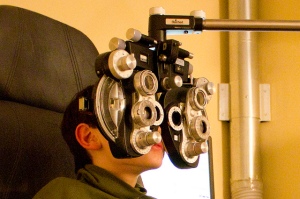May is Healthy Vision Month. Here are a few tips to keep your eyes healthy.

Courtesy of woodleywonderworks on Flickr
Tip 1: Get your eyes checked!
A thorough and comprehensive eye exam will allow your optometrist to fully assess the health of your eyes. Your optometrist not only evaluates your need for glasses and contacts, but also is trained to detect and manage a variety of eye conditions. The American Optometric Association (AOA), recommends the following intervals for eye exams:
Infants: 6 months of age
Toddlers: 3 years old
Children: Before 1st grade and then every two years
Adults: Every two years
Adults over 61: Yearly
***High risk individuals may require more frequent eye exams.
Tip 2: Use sunglasses.
Prescription sunglasses not only can help shield your eyes from glare, they can can also protect them from the damaging effects of the sun. Ultraviolet (UV) light can damage the eyes by aging them prematurely, leading to the formation cataracts. Much like sunscreen, sunglasses with proper UV protection block these harmful rays from the sun, plus they look great. Use sunglasses any time you’re outside. Your optometrist can help find the right tint to enhance your outdoor activities.
Tip 3: Use your glasses and replace your contacts.
Your eye wear is custom fit for you and designed to provide optimal vision. Use your glasses as recommended by your optometrist. This is important for everyone, but especially children and those with high prescriptions, as not doing so can lead to condition know as amblyopia.
Replace your contacts as indicated by you eye doctor. Contact lenses are designed to be replaced at frequent intervals to ensure optimum health of your eyes. Overwearing or overusing your contact lenses can lead to serious complications including infections or even blindness.
Tip 4: Think safety first.
Drilling, sanding, hammering, mowing or doing any other projects around the house or at work? Use safety glasses that are impact resistant, and protect your eyes from injuries. According to the CDC, approximately 2000 work-related eye injuries happen each day. These injuries may not only be uncomfortable, or even painful, but sight threatening.
Tip 5: Eat well to protect your eyes.
Certain vitamins and antioxidants may help to reduce the risks of certain diseases. According to the AOA, vitamin E, vitamin C, lutein & zeaxanthin, zinc, and essential fatty acids are eye friendly nutrients. Be sure to include these nutrients in your well-balanced diet.
~John Barrón, OD
California Optometric Association
www.eyehelp.org
www.coavision.org